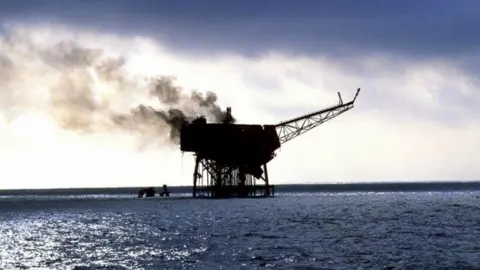Piper Alpha judge worries that workers still fear raising concerns
The judge who headed the Piper Alpha disaster public inquiry has expressed fears that offshore workers still worry about raising safety concerns.
The Piper Alpha platform exploded in July 1988, leaving 167 men dead.
Lord Cullen was speaking as a new oil industry initiative pulling together decades of knowledge in a bid to avoid a repeat of the Piper Alpha disaster was launched in Aberdeen.
He said he hoped the offshore workforce could speak freely about any fears.
'Encompassing the Future: Offshore Oil and Gas Operations' is described as a resource using 40 years of experience.
It was launched by Energy Minister Paul Wheelhouse and was welcomed by Lord Cullen.
Lord Cullen's report into the disaster after a 13-month inquiry led to massive changes in offshore safety.
He said of workers feeling able to raise safety concerns without possible repercussions: "It's been a repeated worry from time to time.
"What I hear are reassuring messages, but I cannot say that there aren't instances of not wanted (back), but I hope it's not happening anymore."
'Not wanted back' is an unofficial term when workers say they have been blacklisted.
Before the disaster, maintenance and upgrading work had been under way but Piper Alpha had been continuing to produce oil.
Explosions and a fireball ripped through the North Sea rig.
In total, 61 men survived.
In all, 106 changes were recommended and all accepted by the industry.

Lord Cullen added: "Painful lessons were learnt from the tragic events on 6 July, 1988.
"These lessons, like so many others in the industry, must never be forgotten.
"They should be used to ensure the safety of the people who work in it, the protection of the environment and the overall economic health and sustainability of offshore operations."
Paul Wheelhouse added: "The oil and gas industry makes a huge contribution to the Scottish economy, and will continue to do so for decades to come.
"Ensuring that the highest safety standards are applied across the industry is, of course, a key priority for all of us, and it is also essential to North Sea sustainability in the long run."
 PA
PA